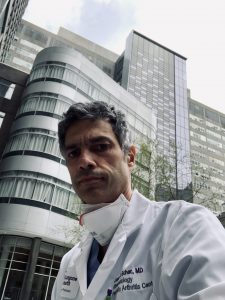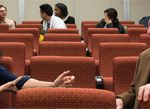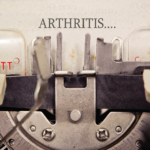A dazzling, omnipresent mantle of darkness has abruptly descended upon us. Our days (and nights) have been perturbed in ways both mundane and, at times, surreal. Many have felt the pillars of life being shaken at the ordinary surface of our routines, but also in a uniquely painful and profound manner. We are anxious, and disoriented and some even utterly paralyzed. We are being pushed to the limit, some physically, others emotionally. This plague has affected each one of us, our families and friends, and abruptly, it has altered the way we relate to one another.
For half a century, we managed to convince ourselves that advances in biotech and our ever-expanding access to devices and simulated platforms would take us to an incontrovertibly better place; that by bending the rules of time and space we would be able to seamlessly trade the real for the virtual.
The problem for this Brave New World, however, is that we humans have evolved to communicate in a manner that transcends the visual and the spoken. We need to be close. Our relationships require a level of intimacy that, for this peculiar moment in time at least, has now all but vanished.
We offer trust with a handshake, generate comfort with a smile, and illuminate someone’s desperate moments with a simple hug (often with a prolonged one). But what was once natural has now become transiently artificial, distant and cold.
We should, therefore, find solace & assurance that the future of rheumatology & our collective endeavor is bright.
Like all of you during the past few weeks, I have witnessed the unintended consequences of abdicating a piece of humanity in ways both trivial and vast. My children could not share laughter with their friends on their birthdays—try to blow out candles over Skype! Others were forced to break sacred promises; there were also those (many) moments when a fellow or a colleague cried on the phone, and all I could mumble was, “It’s going to be all right,” even when I wanted to console not just with my words, but with my arms and eyes.
And then there was Lucy, who could not be by her father’s side before he passed away. On her third day of mourning, she was told her aunt had also succumbed to the virus.
This plague, like the ones before, has brought fear, anxiety and an overwhelming sense of helplessness. There is fear of the unknown, fear of what the future may hold and fear of failing the moral test required to meet the challenge before us and rise to the occasion. But above all, as in the Middle Ages, there is the fear of death; the ultimate dread that incarnates the one battle that we know, with absolute certainty, cannot be won.




